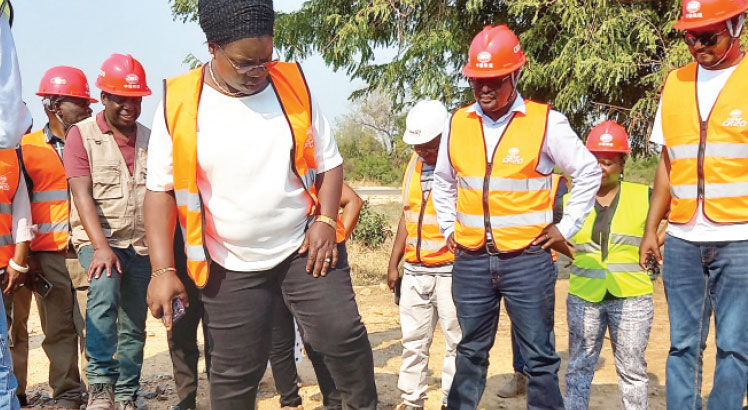Rail project tumbles again
The country’s dream that it would soon have direct access to the Port of Beira in Mozambique have once again been thrown into disarray as government plans to retender construction of the Marka-Bangula railway line.
But sector authorities have expressed fear that the tendering, which will be the third for the same project since 2020, will balloon financing.
The decision to retender comes after government rejected a request to release an additional K28 billion which the contractor working on the 72-kilometre project, China Railway 20 Bureau Group Corporation, requested to complete the work.
The contractor wrote Ministry of Transport and Public Works in August requesting for the extra money due to new scope of works that primarily came as a result of cyclones Ana, Gombe and Freddy that occurred during the prolonged tender stage and after awarding the contract.
The initial cost was K48 billion when the project was first offered to a Portuguese construction and multi-disciplinary conglomerate Mota-Engil in 2021.
It went up to K68.8 billion when government awarded the contract to China Railway 20, after revoking the contract from Mota-Engil in September 2021.
The contract was revoked after the Anti-Corruption Bureau (ACB) received a complaint claiming anomalies and corruption in the procurement process.
The K28 billion additional resources would mean project funding rising to over K96 billion for a project that was scheduled to take 18 months.

Minister of Transport and Public Works Jacob Hara, in an interview on Wednesday, confirmed plans to retender the remaining works, arguing that doing so is a requirement of the Ministry of Finance through the Public Procurement and Disposal of Assets Authority (PPDA).
Hara said the ministry has no authority to just change the figures without Ministry of Finance’s approval through PPDA, which will determine the direction of the projection.
“We only have an allowance of changing up to 15 percent. Anything beyond that, we have to take it back to the ministry. That’s why we had to compile a different contract altogether as opposed to seeking justification for additional payment.
“So, it is easier and faster for us to do it that way, but it will depend on how the Ministry of Finance responds,” he said.
But Hara explained that China Railway 20, commonly referred to as CR20, had been informed to do what they can manage with the money the ministry allocated for the project.
The minister could not, however, explain when the retendering would be done and how long the project will take subsequently.
“It’s not an urgent thing as of now because we are working on the other side as well; so, maybe we may include that portion on the other contract because this railway line will not end at Bangula, it is supposed to go all the way up to Limbe,” explained Hara.
He, however, insisted that the retendering process would not delay the project in any way as construction work is continuing.
The contractor has been working on bridges only and, according to Hara, there is enough materials on site to work on about 20 kilometres of the 72 kilometres.
Hara said: “If we are given that go-ahead through PPDA to pay the K28 billion and Treasury feels it is fine, we will do so. But we know we have things that have stalled and gotten stuck at PPDA.”
Government’s move to retender the project has drawn criticism from some experts who have accused the ministry of being imprudent in handling the project which is significant to the country.
Botswana-based Malawian construction specialist Ezekiel Chirwa argued that the ministry should have used other waivers to ensure the K28 billion, which was inevitable considering the natural disasters, was approved than going back to the drawing board.
He said: “Waivers do apply in everything, but what matters is transparency and accountability. Government has taken a dangerous path which may hinder the project’s progress. Already we hear only one kilometre has been done so far all these months.
“As it stands, we don’t know when the retendering will be done. So, ordinarily, we are talking of not less than six months before another contractor is engaged.”
Chirwa said besides the period, government would have to cough more than the K28 billion which the Chinese contractor requested for to finalise, the process of retendering the project and the recent 44 percent devaluation of the kwacha.
Procurement specialist Edward Chando said looking at the value of the procurement, International Competitive Bidding could be a preferable method to be used and may take almost four months before engaging another contractor.
Chando explained: “Solicitation of bids will need 45 days. Depending on how fast they can coordinate the procurement activities which include evaluation of bids and getting the No Objection from PPDA, and clearances from Government Contracting Unit (GCU), Ministry of Justice, and OPC possibly 90 to 120 days will be sufficient to conclude the procurement process.
“If the procuring entity can decide to use restricted tendering method of procurement with a reduced bidding period, the days could be less than 90 days. However, restricted tendering method requires the approval from PPDA.”
He also said there are provisions in PPDA Act and Public Procurement Regulations 2020 that provide a way of varying the contracts.
“The entity on its own can vary the contract not above 15 percent of the contract price within the approved threshold as provided by PPDA… Above 15 percent and given threshold PPDA is involved,” he said.
Consumers Association of Malawi (Cama) executive director John Kapito observed that there have been several government contracts that have been unfair to the consumers and hoped the Nsanje railway project would not be one of them.
“If government is doing the retendering in good faith, then I would say let us go for it; otherwise; these deals leave a lot to be desired,” he said.
In 2020, President Lazarus Chakwera and his Mozambican counterpart Felipe Nyusi agreed to revive the railway line between the two countries, which is Malawi’s shortest route to the Port of Beira.
However, Mozambique already completed its 44-kilometre section from Mutarara to Marka while Malawi is still working on its 72-kilometre section three years later.
Petroleum Importers Limited (PIL) and National Oil Company of Malawi (Nocma) have said Malawians must anticipate lower landing costs and reduced fuel pump prices once fuel is transported through rail.






One Comment